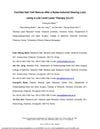March 2024 in “Agriculture” CRISPR/Cas9 gene-editing shows promise for improving sheep and goat breeding but faces challenges with efficiency and accuracy.
 81 citations,
February 1997 in “Journal of Investigative Dermatology”
81 citations,
February 1997 in “Journal of Investigative Dermatology” Minoxidil boosts hair growth by activating PGHS-1.
 90 citations,
October 1998 in “Animal Reproduction Science”
90 citations,
October 1998 in “Animal Reproduction Science” Mouflon rams mature gradually with changes in body, horns, and hormones linked to age and seasons, reaching full sexual maturity well after puberty.
 13 citations,
February 1999 in “International Journal of Cosmetic Science”
13 citations,
February 1999 in “International Journal of Cosmetic Science” Hair loss increases between July and October, possibly due to UV light, and factors like skin type, hair color, and density may affect this. Dandruff can worsen hair loss conditions.
 124 citations,
June 2020 in “Cell Stem Cell”
124 citations,
June 2020 in “Cell Stem Cell” Fat cells in the skin help start healing and form important repair cells after injury.
 3 citations,
September 1989 in “Journal of Investigative Dermatology”
3 citations,
September 1989 in “Journal of Investigative Dermatology” Methyl caprate greatly increases drug absorption through the skin and is better than other enhancers.
 74 citations,
July 1991 in “The Journal of Urology”
74 citations,
July 1991 in “The Journal of Urology” Minoxidil works better than nitroglycerin for treating impotence with fewer side effects.
 July 1996 in “Annals of Internal Medicine”
July 1996 in “Annals of Internal Medicine” Taking high doses of fluconazole for a long time can cause reversible hair loss.
 July 1996 in “Annals of Internal Medicine”
July 1996 in “Annals of Internal Medicine” Long-term high-dose fluconazole can cause reversible hair loss.
 19 citations,
December 2019 in “Steroids”
19 citations,
December 2019 in “Steroids” Finasteride and dutasteride reduce neurosteroid production, possibly helping treat glioblastoma.
 1 citations,
February 2021 in “Animal feed science and technology”
1 citations,
February 2021 in “Animal feed science and technology” Organic selenium may offer better retention and less waste in puppies.
May 2022 in “Cardiovascular Toxicology”  1 citations,
January 2023 in “Frontiers in veterinary science”
1 citations,
January 2023 in “Frontiers in veterinary science” Activating autophagy in dogs with certain diseases improves their skin and hair.
 44 citations,
February 2012 in “The journal of neuroscience/The Journal of neuroscience”
44 citations,
February 2012 in “The journal of neuroscience/The Journal of neuroscience” Mutations in the PTPRQ gene cause significant balance issues in mice due to hair bundle defects in the inner ear.
 March 2024 in “Asian journal of medical sciences”
March 2024 in “Asian journal of medical sciences” Ring block anesthesia is the best method for PRP scalp injections due to low pain and high patient acceptance.
 January 2025 in “PLoS ONE”
January 2025 in “PLoS ONE” ING5 is crucial for stem cell maintenance and preventing certain cancers.
 11 citations,
January 2001 in “Cambridge University Press eBooks”
11 citations,
January 2001 in “Cambridge University Press eBooks” Androgens can cause hair growth in some areas but hair loss on the scalp.
![Distribution of 1,25-Dihydroxyvitamin D3[22-Oxa] In Vivo Receptor Binding in Adult and Developing Skin](/images/research/d9b990e6-6243-4abe-b868-68801a5844f7/small/35023.jpg) 15 citations,
January 1995 in “Archives of dermatological research”
15 citations,
January 1995 in “Archives of dermatological research” OCT binds strongly to hair sheath cells and may affect skin and hair growth with fewer side effects than vitamin D3.
 January 2024 in “International Ayurvedic medical journal”
January 2024 in “International Ayurvedic medical journal” Certain Prakruti types are more prone to early male pattern baldness.
 January 2023 in “Brazilian Journals Editora eBooks”
January 2023 in “Brazilian Journals Editora eBooks” Girls with Autism Spectrum Disorder may show different symptoms than boys, leading to missed or delayed diagnoses.
 January 2023 in “Brazilian Journals Editora eBooks”
January 2023 in “Brazilian Journals Editora eBooks” Psychiatrists are crucial in pain management teams because they help treat severe pain and related mental health issues.
 2 citations,
January 2017 in “Düşünen Adam”
2 citations,
January 2017 in “Düşünen Adam” Agomelatine might help stop hair loss caused by valproate.

Low Level Laser Therapy may improve noise-induced hearing loss.
1 citations,
November 2011 in “British journal of pharmacology” Enzymes are classified into six types and are essential for many biological processes, with only a few targeted by drugs.
 February 2025 in “International Journal of Molecular Sciences”
February 2025 in “International Journal of Molecular Sciences” RORA plays a key role in controlling seasonal hair molting by affecting hair follicle cell activity.
 11 citations,
January 1998 in “Dermatology”
11 citations,
January 1998 in “Dermatology” Spironolactone works well for acne and hirsutism, isotretinoin is very effective for acne and may have antiandrogenic effects, and 5 alpha-reductase inhibitors should be considered antiandrogens.
 1 citations,
April 2020 in “bioRxiv (Cold Spring Harbor Laboratory)”
1 citations,
April 2020 in “bioRxiv (Cold Spring Harbor Laboratory)” Goat skin changes with the seasons due to genes affected by daylight and hormones.
September 2023 in “Animals” Hair follicle development in cashmere goats involves dynamic changes in proteins and metabolites, with key roles for oxytocin, MAPK, and Ca2+ pathways.
92 citations,
September 2013 in “Journal of Investigative Dermatology” BMAL1 and Period1 genes can influence human hair growth.
 January 2023 in “Biomaterials Science”
January 2023 in “Biomaterials Science” Certain genes are more active during wound healing in axolotl and Acomys, which could help develop materials that improve human wound healing and regeneration.















![Distribution of 1,25-Dihydroxyvitamin D3[22-Oxa] In Vivo Receptor Binding in Adult and Developing Skin](/images/research/d9b990e6-6243-4abe-b868-68801a5844f7/small/35023.jpg)








